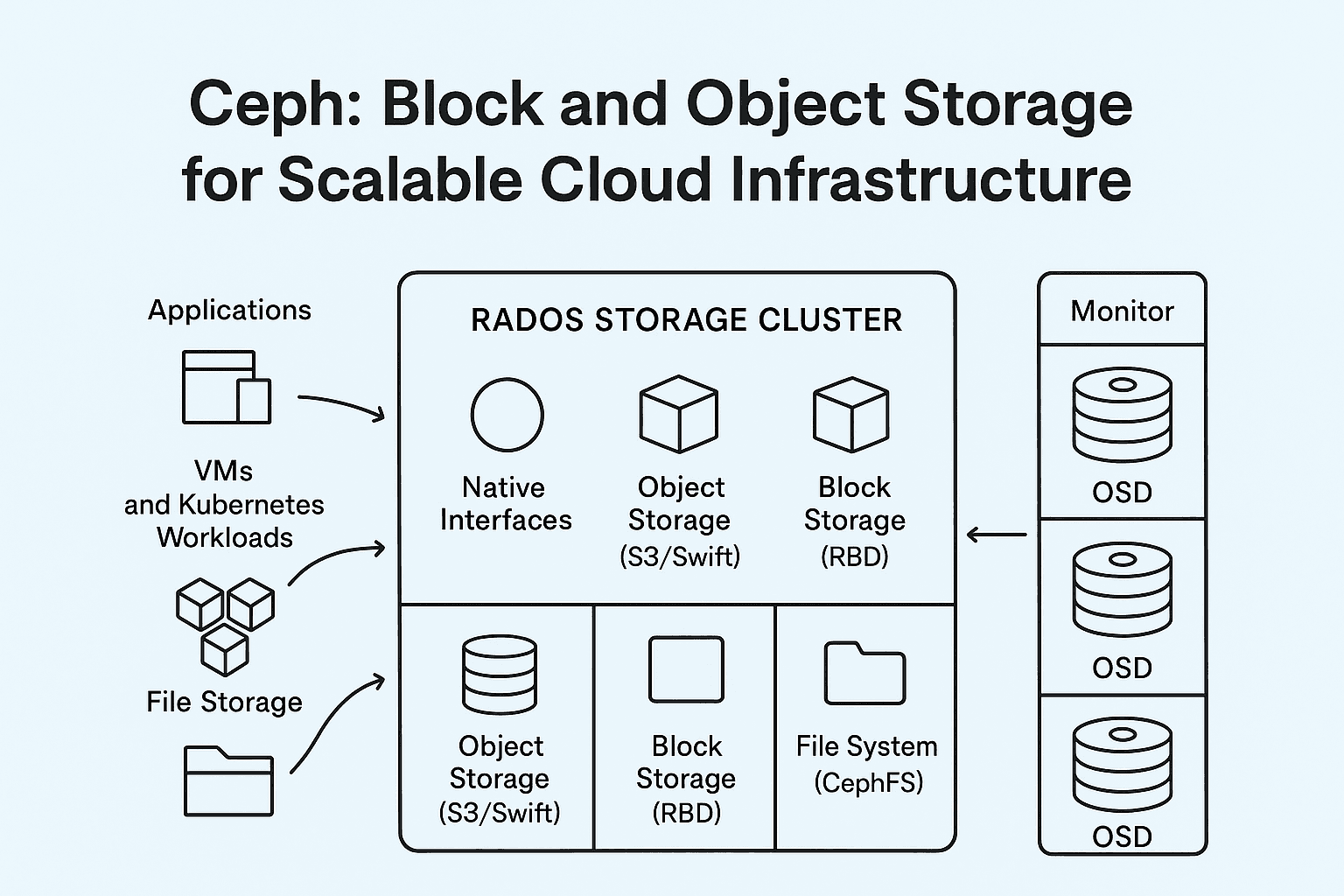
Ceph Block and Object Storage for Scalable Cloud Infrastructure
Modern cloud platforms demand storage systems that are flexible, scalable, and resilient. As virtual machines, containers, and hybrid environments become more common, organizations need a storage solution that supports multiple use cases without added complexity or vendor lock-in.
Ceph is an open-source, software-defined storage system that delivers unified support for block, object, and file storage. Designed to scale from a few nodes to thousands, Ceph has become a foundational technology for cloud-native infrastructure, especially in environments built with Kubernetes and OpenStack.
What Is Ceph?
Ceph is based on a distributed architecture called RADOS (Reliable Autonomic Distributed Object Store). It is designed to run on commodity hardware and automatically replicates, balances, and recovers data across nodes in the cluster.
A single Ceph deployment can provide:
Block storage via RADOS Block Device (RBD)
Object storage via RADOS Gateway (RGW) with S3 and Swift compatibility
File storage via CephFS (POSIX-compliant file system)
This unified approach reduces the need for separate storage systems and simplifies infrastructure operations.
Ceph Block Storage (RBD)
Block storage is essential for applications that require fast, consistent access to data, such as virtual machines and databases. Ceph’s RBD interface delivers distributed block devices that can be dynamically provisioned, resized, cloned, and snapshotted.
In OpenStack, Ceph RBD is widely used as the backend for:
Cinder (persistent volumes)
Nova (ephemeral disks)
Glance (image storage)
In Kubernetes, RBD volumes are provisioned through the Ceph CSI driver, enabling persistent storage for containerized workloads.
Ceph Object Storage (RGW)
Object storage excels in use cases such as backup, media delivery, log storage, and big data. Ceph provides object storage through its RADOS Gateway (RGW), which supports both Amazon S3 and OpenStack Swift APIs.
Features include:
S3-compatible buckets
Keystone integration (for OpenStack)
Multi-site replication
Lifecycle management
This makes Ceph a viable alternative to public cloud object storage providers, especially for private or hybrid deployments.
Key Advantages of Ceph
Unified Architecture
Ceph consolidates block, object, and file storage into a single platform, reducing complexity and operational overhead.
Scalability
Ceph clusters scale horizontally by adding more storage nodes. Its CRUSH algorithm ensures data is automatically balanced without bottlenecks.
High Availability
Data is replicated across failure domains. If a node or disk fails, Ceph continues to serve data while rebalancing and recovering in the background.
Cost Efficiency
Ceph runs on standard servers and disks. Organizations avoid proprietary hardware costs and gain full control over storage growth.
Performance and Flexibility
Ceph supports SSD acceleration, erasure coding, and configurable replication policies to meet performance and capacity needs.
Kubernetes Integration with Rook
Rook is a Kubernetes Operator that automates the deployment and management of Ceph clusters inside Kubernetes. With Rook and the Ceph CSI drivers, users can dynamically provision block volumes (RBD) or shared file storage (CephFS) directly from Kubernetes manifests.
Benefits include:
Automated scaling and upgrades
Self-healing storage infrastructure
Native integration with Kubernetes APIs
Rook allows teams to run enterprise-grade storage natively within Kubernetes, making Ceph an ideal choice for stateful containerized applications.
Ceph in OpenStack Environments
Ceph is the most widely adopted storage backend for OpenStack. It supports key OpenStack services out of the box:
Cinder: Block volumes from RBD
Glance: Images stored as RBD snapshots
Nova: Instances with RBD-based ephemeral disks
Swift: Object storage via RGW with full Swift API support
Ceph simplifies operations, improves performance, and enables fast provisioning through cloning and snapshots. It is also more cost-effective and scalable than legacy NFS or iSCSI backends.
Use Cases for Ceph
Hosting providers offering VPS or private cloud solutions
Enterprises deploying OpenStack or Kubernetes platforms
DevOps teams building CI/CD pipelines with persistent workloads
Data centers managing large-scale backups, logs, or multimedia
Research institutions requiring petabyte-scale data retention
Ceph provides a unified, open-source storage solution that meets the performance, availability, and flexibility demands of modern infrastructure. Whether you need scalable block volumes for VMs and containers, object storage for applications, or a reliable backend for OpenStack and Kubernetes, Ceph delivers on all fronts.
Its ability to consolidate multiple storage types under one distributed system makes it a practical and future-proof choice for cloud-native environments.
